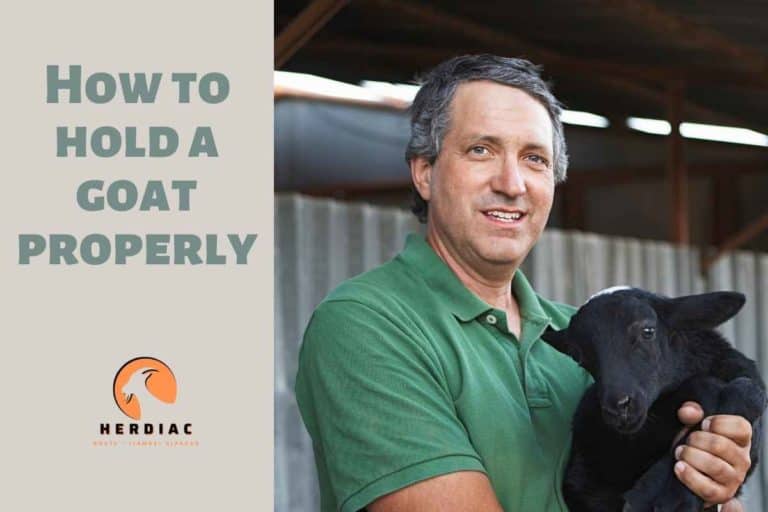What to Do If a Goat’s Horn Breaks Off: Options for Domesticated Goats
If you are the owner of a domesticated goat, there’s a good chance you will at some point have to deal with a broken horn. Horns can break off for many reasons – from fighting with another goat to getting caught in fencing. If your goat’s horn breaks off, don’t panic! This article will provide you with all the information you need to make sure your goat remains healthy and comfortable and what to do if a goats horn breaks off.
WARNING: This article contains graphic images of injuries to goat horns that some readers may find disturbing. Discretion is advised.

Let’s face it – goats can be troublemakers, which can often lead them to tricky situations that might otherwise be unexpected.
However, one such complication that many goat owners fail to thoroughly prepare for is the risk that our beloved goats could snap, damage, or otherwise fully break off a horn.
As such, as a domesticated goat owner, there’s a decent chance you may have to deal with a broken horn at some point, be it a small scratch or a more significant injury and even life-threatening.
Luckily, you can take steps to ensure your goat stays as comfortable as possible until you can get them to the vet clinic. As such, today’s guide will cover several ideas for what to do if a goat’s horn breaks off to help.

My Experience with What To Do If a Goat’s Horn Breaks Off
Before we go any further, I’ll briefly outline my own personal experience with broken horns.
As a Boer goat breeder personally, it was perhaps only a matter of time before we saw one of our goats break their horns – in fact, we were perhaps lucky to have missed this reality for around nine years.
However, I’ll never forget that morning when I walked out to the barn to feed the goats and headed to the buck kids’ pen – around three/four months at the time, from memory – covered in blood.
It was a horrific sight, and my heart instantly fell, knowing something had gone drastically wrong.

And, even before I saw the culprit, I knew who it would inevitably be: the buck kid I’d planned to keep as a breeding buck. Of course, it was – sod’s law (or Murphy’s law, depending on where you’re from) and all that.
The sight wasn’t a pleasant one. The buck kid’s horns just the night before had been perfectly positioned, gently sweeping behind his ears. But suddenly, one was sticking up at a forty-five-degree angle, and the poor thing was covered in blood.
Of course, he still looked excited about his morning hay – goats are always very food-oriented – but I knew I had to take action immediately to ensure he didn’t nudge it again and re-open the flow of blood. And believe me, lifting a 35-40kg buck kid with a broken horn over a fence isn’t easy when his brothers are all trying to mob you for food simultaneously!
We never quite worked out what caused him to damage his horn – but a few days later, he was disbudded and on the way to recovering.
Charlotte Riggs – Boer Goat farmer
What Happens if a Goat’s Horn Breaks Off?
Well, as was the case in my example, you’ll probably notice blood – and lots of it. The horns in goats act not only as weapons and display pieces but also help regulate the body temperature.

This may mean that they have a large blood flow – and, of course, this can cause a lot of bleeding if the horn is broken.
How each individual animal reacts to this will naturally differ depending on the severity of the damage and some goat breeds may bleed worse than others, but the amount really is down to the injury itself.
Some animals might just chip their horn, for example, which may not bleed much (or at all). Others could chip the base, which might be more likely to bleed, or could dislodge the horn from the base.
Ways Goat Horns Can Fall Off or be Broken
Goats are playful animals, but they’re also often getting into tricky situations. As such, this poses a lot of risks for them getting hurt.
In addition, older goats may have weaker horns that could be more prone to damage or snapping. Meanwhile, getting the horns caught in feeders or otherwise injuring themselves while fighting with other goats can both be reasons for goat horns to fall off or be broken.
We should point out here that, unlike deer, goats should not naturally shed their horns annually. As such, if you notice your goat’s horn is damaged, you may need to seek urgent veterinary advice.
What to Do For a Goat Horn Injury
Since your goat’s horns have such a massive blood supply, the most important first thing is to control bleeding rapidly with a clean material and pressure point that won’t pose further damage or infection risk to the injury.
Be especially careful when adding direct pressure to the horn stump and apply pressure only as necessary to be able to either treat the horn or get to veterinary services.

Once the bleeding has stopped or slowed, you can then begin considering options for what to do next.
Stopping infection, of course, is important; this may require an antibacterial spray and regular monitoring to ensure the wound does not become infected. In addition, you should ideally not handle the horn while it is healing, as doing so could dislodge the horn and cause further bleeding.
Any steps at this point must always be taken on veterinary advice and with veterinary prescriptions, so be sure to inform your vet at the earliest opportunity to ensure your goat has the best chance of recovery.
What Happens If You Have to Remove a Horn?
If your goat horns are severely damaged, you may need to get the horn removed.
We would recommend you obtain veterinary services for this, as cutting off a goat’s horn requires very specialist care due to the number of blood vessels in the goat’s horns and especially in the common case of the sinus cavity being exposed.
Once the goat returns home, you should keep it next to other goats but separate for a while to ensure it does not try to fight.
Always follow your vet’s specific instructions on how to treat the horn wound, too. This might require antibiotic sprays, blood stop powder or injections or could be just a case of keeping an eye to ensure the healing progresses normally.

A bad break and open wound will be treated differently from a broken tip or a clean break from the horn base.
Remember, every case is different, so always follow professional advice before deciding how to treat your goat if it’s damaged a horn.
Final Thoughts and Questions
There’s never a good time for something to go wrong with a beloved pet goat – but, of course, goats being goats will always get themselves into shenanigans!
With this in mind, knowing what to do if a goat’s horn breaks off is crucial for all goat keepers. And, while it’s only something you’ll likely only face very rarely, if at all, being ready is always better than being caught out unprepared.

Will a Broken Horn Grow Back?
Goat horns grow from an early age and often a process of dehorning goats, known as disbudding is undertaken before the horn breaks through the skin. This prevents the goat from growing fully developed horns, and therefore in the case of a broken horn, it will not grow back in most cases.
A damaged horn in a young goat may continue to develop retaining some signs of the prior damage, much like a damaged cuticle on your fingernail may continue to grow a disfigured nail for life.
Do Goat Horns Bleed?
Goat horns have blood vessels and can bleed when broken, but the amount of blood will depend on the extent of the injury. A broken horn at the base of the skull is going to cause significant bleeding in most cases.
If you have read through this article to arrive here, you will know that most certainly one might expect blood when the horn is broken from the skull.
The featured image and some images in this post have been derived from a post from member ALBoergoats on The Goat Spot Forum

Charlotte Riggs
A passionate owner and breeder of Boer Goats, Charlotte is ensconced in daily goat farm life at Himmon Boer Goats in the UK. A member of the British Boer Goat Society, she spends her spare time also involved with goats. You could say, and she would admit, she is somewhat obsessed!

